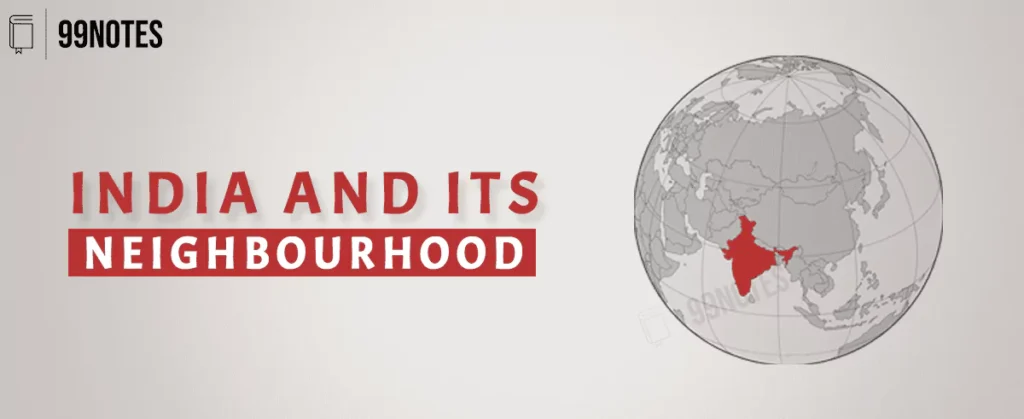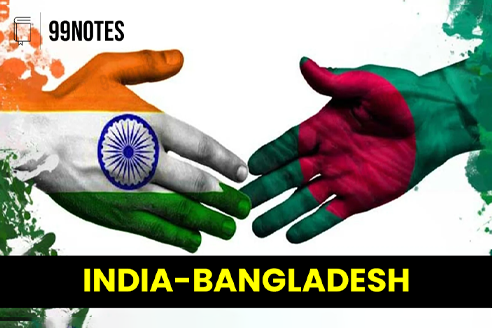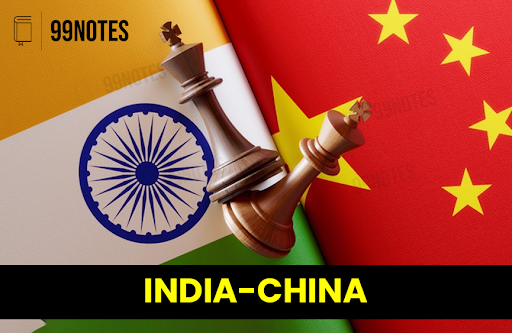
India & Its Neighbourhood Free UPSC Notes Download

India-Bangladesh
India and Bangladesh share bonds of rich historical ties, including language, trade relations and culture. The bilateral ties reflect an all-encompassing partnership based on equality, sovereignty, trust, and understanding that goes far beyond a strategic partnership.

India-China
India shares a border of 3488 km with China, which runs along the Union Territory of Jammu & Kashmir and the states of Himachal Pradesh, Uttarakhand, Sikkim, and Arunachal Pradesh. Separated by the Great Himalayan range
More About India & its Neighbourhood
India’s relations with its neighbors are an important topic for the Civil Services Exam in India, as the country’s external relations have a significant impact on its security and development.
India shares borders with seven countries:
Pakistan, China, Nepal, Bhutan, Bangladesh, Myanmar, and Afghanistan. India’s relations with these countries are diverse and complex, and vary greatly depending on the specific country and the issues at hand.
India has a long and contentious history with Pakistan, with which it has fought several wars and continues to have disputes over issues such as Kashmir and cross-border terrorism. The relationship between the two countries has been marked by periods of hostility and efforts to improve relations, and it is an important factor in India’s foreign policy.
India also has a complex relationship with China, with which it shares a long border and has competing territorial claims. While there have been efforts to improve economic ties and enhance cooperation in areas such as trade and infrastructure development, there have also been tensions, particularly over border disputes and China’s growing influence in the region.
India’s relations with Nepal, Bhutan, and Bangladesh are generally more positive, and these countries are important partners in regional economic and security cooperation. India is also engaged in various development projects in these countries and provides assistance in areas such as infrastructure, education, and healthcare.
India’s relations with Myanmar and Afghanistan are also important for regional stability and security, and India has been involved in various initiatives to promote peace and development in these countries.
In addition to its relations with individual countries, India is also a member of various regional and international organizations, such as the United Nations, the World Trade Organization, and the Shanghai Cooperation Organization, which provide platforms for cooperation and dialogue with other countries.
What is the Neighborhood First Policy of India?
In accordance with its ‘Neighborhood First’ policy, India is dedicated to fostering amicable and mutually beneficial relationships with all of its neighbours.
India is an active development partner in these nations and is participating in a number of initiatives.
The ‘Neighborhood First’ strategy of India focuses on establishing regional frameworks for peace and development that are mutually beneficial and centred on the well-being of the people.
India’s engagement with these nations is based on a consultative, non-reciprocal, and outcome-oriented strategy that focuses on delivering benefits such as increased connectivity, improved infrastructure, strengthened development cooperation in various sectors, security, and increased people-to-people contacts.
Purpose:
Connectivity:
India has signed a Memorandum of Understanding (MoU) with South Asian Association for Regional Cooperation members (SAARC).
These agreements enable the cross-border free flow of resources, energy, products, labour, and information.
- Improving Ties with Neighbors: Improving relations with near neighbours is a top priority, as peace and tranquilly in South Asia are important to achieving the development plan.
- It emphasises robust regional diplomacy by interacting with neighbouring states and constructing political connectedness through discussion.
- It focuses on strengthening commercial connections with neighbouring nations.
- India has engaged in and invested in SAARC as a tool for regional development.
- The Bangladesh-Bhutan-India-Nepal (BBIN) grouping for energy development, including motor vehicles, waterpower management, and inter-grid connection, is one such example.
- Disaster Management: The policy also focuses on disaster response cooperation, resource management, weather forecasting and communication, as well as disaster management capacities and knowledge for all South Asian populations.
- Military and Defense Cooperation: India is also committed to enhancing regional security through military cooperation by conducting and participating in several defence exercises.
It is important for civil servants to have a deep understanding of India’s relations with its neighbors and the various factors that shape these relationships. This includes an awareness of the historical and cultural context, the economic and security implications, and the role of regional and international organizations. Civil servants should also be familiar with the policies and programs that India has in place to address issues with its neighbors and to promote regional cooperation and stability.

